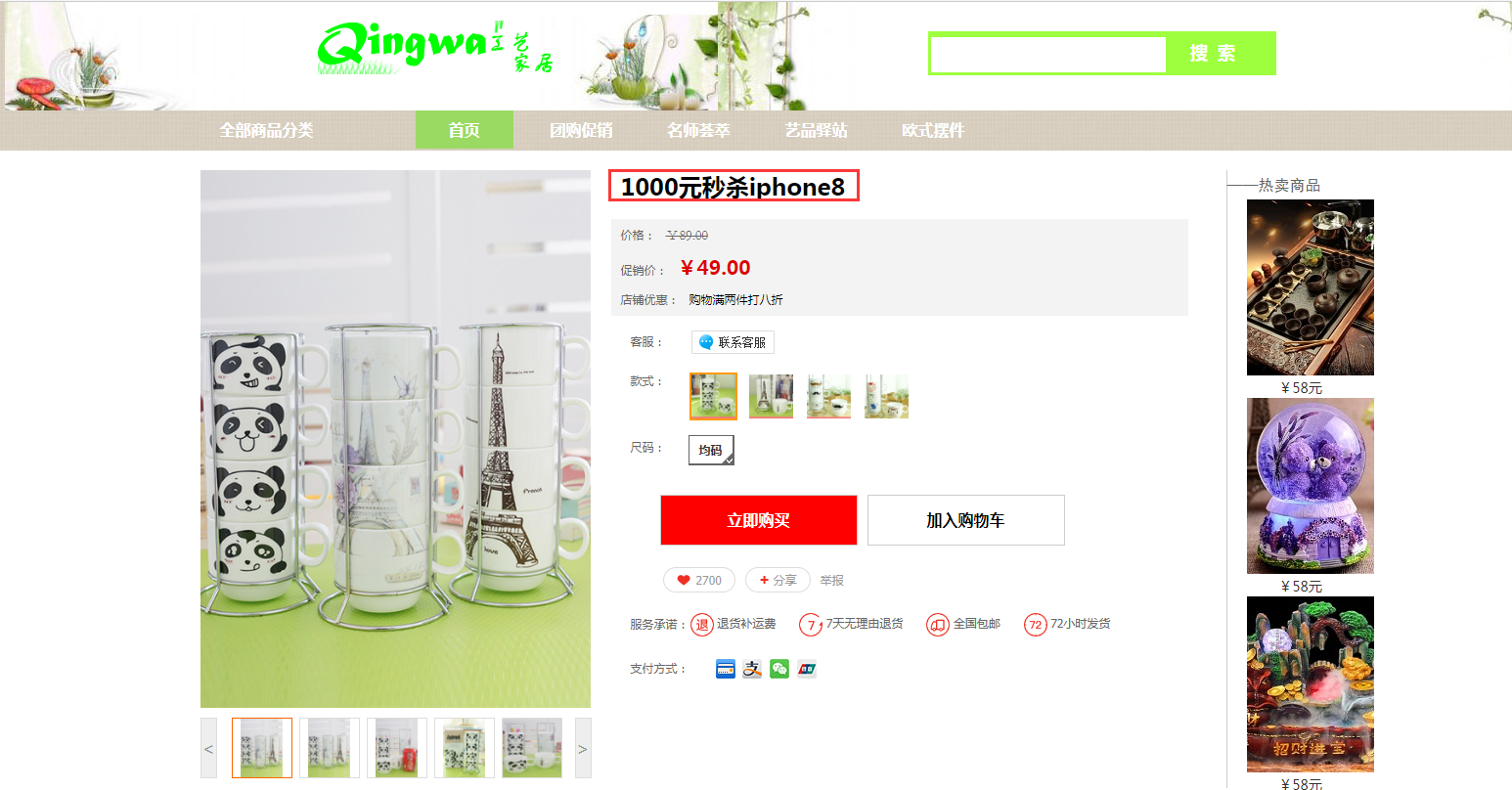
前言
大家都知道淘宝、天猫、京东以及聚美之类的电商网站,她们的商品页会存在多套模板,各套模板的元数据是一样的,只是展示方式不一样。特别是对于店主而言商品详情页个性化需求非常多,就商品单页各个维度信息来说,数据来源也是非常多的。这时候,如果我们再实时的去查询各个数据源组织数据,对于数据库来说开销是巨大的,秒杀更是如此。
静态化
在这里我们就做一个简单商品详情页静态页生成,大家工作中根据实际情况做调整优化。后面如果大家对商品详情页架构感兴趣,可以去了解下《亿级流量网站架构核心技术》书中的如何构建需求响应式亿级商品详情页,毕竟前人栽树后人乘凉,里面还是有很多大家可以借鉴的地方。
我们选用freemarker做模板,pom.xml引入:
<!-- freemarker 模版 生成静态页 -->
<dependency>
<groupId>org.springframework.boot</groupId>
<artifactId>spring-boot-starter-freemarker</artifactId>
</dependency>application.properties配置相关参数:
#freemarker(用于商品静态页生成简化版)
spring.freemarker.template-loader-path=classpath:/static/template/
spring.freemarker.suffix=.flt
spring.freemarker.enabled=true
spring.freemarker.cache=false
spring.freemarker.charset=UTF-8
spring.freemarker.content-type=text/html
spring.freemarker.allow-request-override=false
spring.freemarker.check-template-location=true
spring.freemarker.expose-request-attributes=false
spring.freemarker.expose-session-attributes=false
spring.freemarker.expose-spring-macro-helpers=false
#商品静态页
spring.freemarker.html.path = D://file//goods.flt定义商品单页模板:
# 模板太大了,这里不做展示,请自行参考源码
static/template/goods.fltICreateHtmlService静态化接口:
/**
* 生成商品静态页
* 创建者 小柒2012
*/
public interface ICreateHtmlService {
Result createAllHtml();
}CreateHtmlServiceImpl静态化实现:
@Service
public class CreateHtmlServiceImpl implements ICreateHtmlService {
private static int corePoolSize = Runtime.getRuntime().availableProcessors();
//多线程生成静态页面
private static ThreadPoolExecutor executor = new ThreadPoolExecutor(corePoolSize, corePoolSize+1, 10l, TimeUnit.SECONDS,
new LinkedBlockingQueue<Runnable>(1000));
@Autowired
public Configuration configuration;
@Autowired
private SeckillRepository seckillRepository;
@Value("${spring.freemarker.html.path}")
private String path;
@Override
public Result createAllHtml() {
List<Seckill> list = seckillRepository.findAll();
final List<Future<String>> resultList = new ArrayList<Future<String>>();
for(Seckill seckill:list){
resultList.add(executor.submit(new createhtml(seckill)));
}
for (Future<String> fs : resultList) {
try {
System.out.println(fs.get());//打印各个线任务执行的结果,调用future.get() 阻塞主线程,获取异步任务的返回结果
} catch (InterruptedException e) {
e.printStackTrace();
} catch (ExecutionException e) {
e.printStackTrace();
}
}
return Result.ok();
}
class createhtml implements Callable<String> {
Seckill seckill;
public createhtml(Seckill seckill) {
this.seckill = seckill;
}
@Override
public String call() throws Exception {
Template template = configuration.getTemplate("goods.flt");
File file= new File(path+seckill.getSeckillId()+".html");
Writer writer = new OutputStreamWriter(new FileOutputStream(file), "UTF-8");
template.process(seckill, writer);
return "success";
}
}
}最后通过swagger-ui页面执行以下生成商品页操作,不出意外目录下会生成四个商品页面,打开如下图所示:

思考
- 为什么要构建静态商品页,说出你的理由?
- Nginx处理静态页的速度为什么会优于Tomcat?
- 多维度的商品页,单个维度的变动如何不影响全局?
代码案例:从0到1构建分布式秒杀系统

